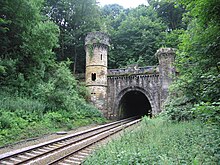Bramhope Tunnel

Bramhope Tunnel north portal
|
|
| Overview | |
|---|---|
| Line | Harrogate Line |
| Location | Horsforth–Weeton |
| Coordinates | 53°53'23"N. 1°36'45"W. |
| Operation | |
| Work begun | 1845 |
| Opened | 1849 |
| Owner | Network Rail |
| Operator | Northern |
| Technical | |
| Length | 2.138 miles (3.441 km) |
| Track gauge | Standard gauge; double track |
| Operating speed | 60 miles per hour (97 km/h) |
| Tunnel clearance | 25 feet (7.6 m) |
| Grade | 1 in 94 (0.01%) |
Bramhope Tunnel is on the Harrogate Line between Horsforth station and the Arthington Viaduct in West Yorkshire, England. Services through the railway tunnel are operated mainly by Northern. The tunnel was constructed during 1845–1849 by the Leeds and Thirsk Railway. It is notable for its 2.138-mile (3.441 km) length and its Grade II listed, crenellated north portal. The deaths of 24 men who were killed during its construction are commemorated in Otley churchyard by a monument that is a replica of the tunnel's north portal.
Thomas Grainger was the engineer for the line and James Bray the contractor. Two sighting towers were erected and 20 shafts sunk along the tunnel's line. Men excavated rock from the shaft faces until the shafts were connected and the tunnel was completed in 1848. Thousands of navvies lived locally in temporary bothies with their families, and worked in dangerous and wet conditions to facilitate the grand opening in 1849.
In the mid-1840s Railway Mania was taking hold and railway companies competed with each other to bring forward schemes to access Wharfedale. Most of these schemes did not come to fruition but the Leeds and Thirsk Railway Company's proposal, a counter to George Hudson's "megalomania", to build a line from Leeds to Thirsk received approval in an Act of Parliament in 1845. The line would open up trade in Leeds to the North East and access lower Wharfedale. Among the several major obstacles on the route was the ridge between Airedale and Wharfedale requiring a long tunnel between Horsforth and Arthington under Bramhope village. The company appointed Thomas Grainger as engineer for the project and James Bray was the contractor for the Bramhope contract. Bray, of Black Bull Street in Leeds, was originally a brass and iron founder.
...
Wikipedia
